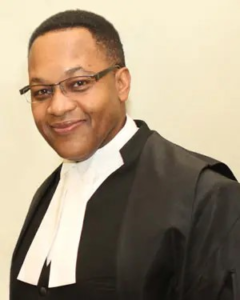
By Lincoln DePradine
Chief Justice Michael Tulloch and the Ontario Court of Appeal want changes to the authority given to Canada Border Services Agency (CBSA) officers to search the cellphone and other devices of travelers, saying new measures are needed to guard against discrimination at the border and to ensure searches are not based on “racial stereotypes”.
Current Canadian law allows CBSA agents to search phones and other devices, such as tablets and laptops, as long as officers are sincerely trying to find evidence of illegal activity.
However, the Court of Appeal, in a decision released Friday, said there’s a need for a higher threshold justifying the searches.
The justices, including Tulloch, concluded that the existing law violates the right to be free from unreasonable searches that is guaranteed by the Canadian Charter of Rights and Freedoms.
The law “mostly misses the mark” and is “the lowest possible standard to justify a search”, according to Chief Justice Tulloch.
“Because the border is not a Charter-free zone, it is also not an almost-anything-goes zone for highly intrusive searches like digital device examinations,” wrote Tulloch on behalf of a unanimous three-judge panel that included Justices Jonathon George and Patrick Monahan.
Tulloch pointed out that about 62 percent of more than 31,000 searches of digital devices conducted by CBSA, between 2017 and 2020, uncovered no evidence of illegal activity.
“This significant invasion of the privacy of many innocent travellers is a strong sign that the law is unreasonable,” said Tulloch, a Jamaican-Canadian and Osgoode Hall Law School graduate, who also is a former president of the Canadian Association of Black Lawyers.
He was appointed Chief Justice of Ontario in December 2022. He’s the first Black judge appointed to the Ontario Court of Appeal and the first Black Chief Justice of any Canadian province.
The court’s ruling was in an appeal hearing involving two men arrested on child pornography charges, following searches of their devices by border officers in 2020.
Chief Justice Tulloch condemned child pornography, saying “offences against children are abhorrent in nature and have lasting and widespread societal impact”.
Nonetheless, the court found the search law to be unconstitutional. The judges, in their 114-page decision, gave Canada’s parliament six months to come up with new legislation.
A new, more elevated threshold would guard “against discrimination at the border”, said Chief Justice Tulloch.
The court ruled that CBSA officers must have a “reasonable suspicion”, based on an objective set of facts in each case, showing the valid possibility of a crime that would justify a search, and not on the grounds of “racial stereotypes.”
This is the same, higher threshold used to justify strip searches at the border.
“This prevents border officers from relying on mere hunches, intuition, and uncorroborated tips of unknown reliability,” said Tulloch.
The Canadian Civil Liberties Association (CCLA), which appeared before the Ontario Court of Appeal as an intervenor in the case, applauded the judges’ decision, saying “the state should not be able to view your personal and private information for no reason at all”.
A person’s “ability to move across the border, without being subjected to unjustified state intrusion into our personal devices, is vital to a free and healthy society”, CCLA added.
“Our electronic devices are a limitless trove of our most personal, intimate, and sensitive information. Any search of these devices should be circumscribed by a stringent standard and clear legislative safeguards.”
CCLA, arguing against what it describes as the “low visibility search-power” of border staff and their “limitless, standardless searches”, said such action “disproportionately affects the most vulnerable in our society”.
As an example, the Civil Liberties Association said CBSA officers “may stop people coming from certain countries to search their devices simply because of myths and stereotypes about that country — reinforcing stereotypes and targeting minority individuals”.
As well, said CCLA, officers “may also initiate searches of people’s devices because they display characteristics that they think are suspicious, such as being nervous. Marginalized individuals may appear nervous around authority figures for precisely the same reason why they are being searched — unchecked officer discretion”.


